Top Rankings
Lamar County School District ranks among the top 20% of public school district in Alabama for:
Category
Attribute
Math Proficiency
Highest math proficiency (Top 20%)
For the 2025 school year, there are 3 public preschools serving 1,589 students in Lamar County School District. This district's average pre testing ranking is 7/10, which is in the top 50% of public pre schools in Alabama.
Public Preschools in Lamar County School District have an average math proficiency score of 41% (versus the Alabama public pre school average of 31%), and reading proficiency score of 53% (versus the 49% statewide average).
Minority enrollment is 16% of the student body (majority Black), which is less than the Alabama public preschool average of 48% (majority Black).
Overview
This School District
This State (AL)
# Schools
5 Schools
648 Schools
# Students
2,176 Students
310,670 Students
# Teachers
131 Teachers
18,546 Teachers
Student : Teacher Ratio
17:1
17:1
District Rank
Lamar County School District, which is ranked within the top 50% of all 145 school districts in Alabama (based off of combined math and reading proficiency testing data) for the 2021-2022 school year.
The school district's graduation rate of 85-89% has decreased from 90-94% over five school years.
Overall District Rank
#44 out of 145 school districts
(Top 50%)
(Top 50%)
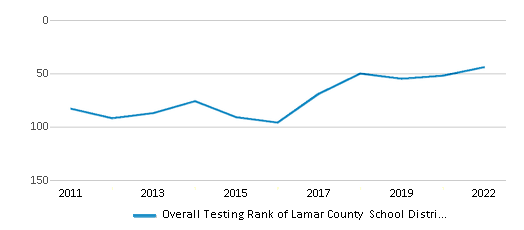
Math Test Scores (% Proficient)
35%
29%
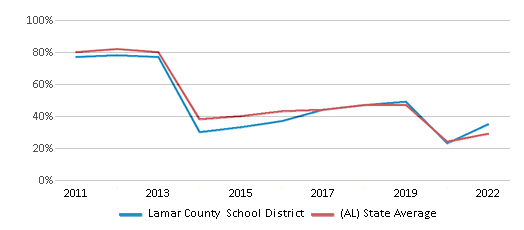
Reading/Language Arts Test Scores (% Proficient)
47%
47%
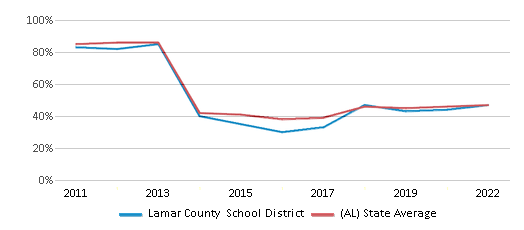
Science Test Scores (% Proficient)
26%
38%
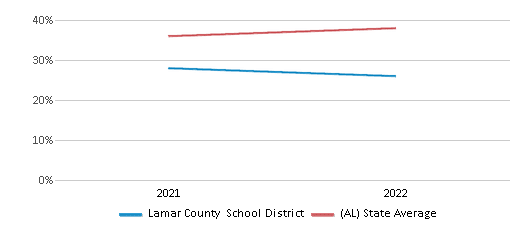
Graduation Rate
85-89%
88%
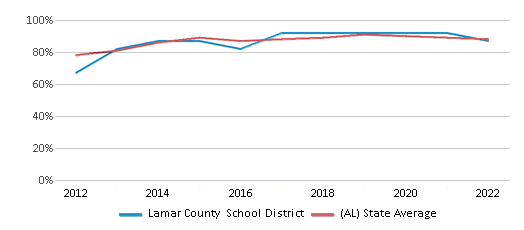
Students by Ethnicity:
Diversity Score
0.29
0.63
# American Indian Students
n/a
3,275 Students
% American Indian Students
n/a
1%
# Asian Students
4 Students
3,474 Students
% Asian Students
n/a
1%
# Hispanic Students
45 Students
33,026 Students
% Hispanic Students
2%
11%
# Black Students
237 Students
93,822 Students
% Black Students
11%
30%
# White Students
1,825 Students
162,634 Students
% White Students
84%
52%
# Hawaiian Students
1 Student
315 Students
% Hawaiian Students
n/a
n/a
# Two or more races Students
64 Students
14,124 Students
% of Two or more races Students
3%
5%
Students by Grade:
# Students in PK Grade:
58
21,304
# Students in K Grade:
191
49,720
# Students in 1st Grade:
153
50,373
# Students in 2nd Grade:
173
48,594
# Students in 3rd Grade:
154
40,410
# Students in 4th Grade:
153
36,751
# Students in 5th Grade:
164
31,378
# Students in 6th Grade:
162
12,553
# Students in 7th Grade:
153
4,421
# Students in 8th Grade:
168
4,401
# Students in 9th Grade:
161
2,950
# Students in 10th Grade:
159
2,768
# Students in 11th Grade:
160
2,555
# Students in 12th Grade:
167
2,492
# Ungraded Students:
-
-
District Revenue and Spending
The revenue/student of $13,294 is higher than the state median of $13,006. The school district revenue/student has stayed relatively flat over four school years.
The school district's spending/student of $10,955 is less than the state median of $12,220. The school district spending/student has stayed relatively flat over four school years.
Total Revenue
$29 MM
$9,671 MM
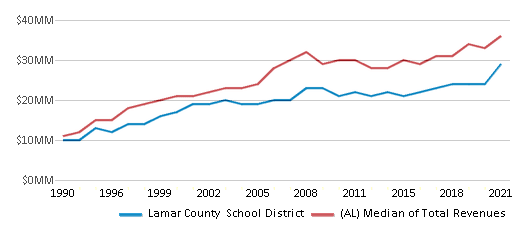
Spending
$24 MM
$9,086 MM
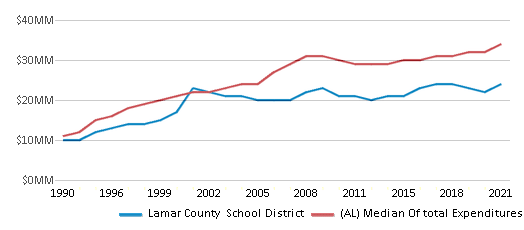
Revenue / Student
$13,294
$13,006
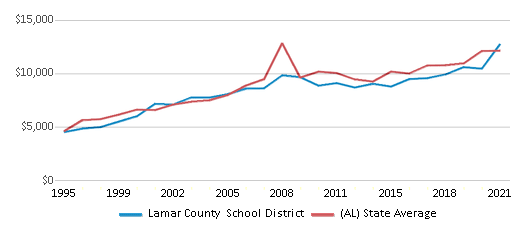
Spending / Student
$10,955
$12,220
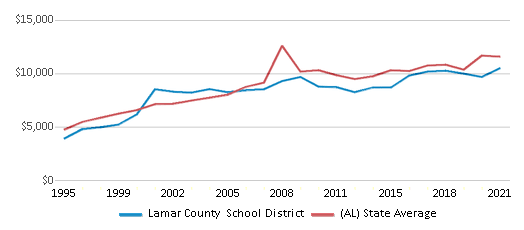
Best Lamar County School District Public Preschools (2025)
School
(Math and Reading Proficiency)
(Math and Reading Proficiency)
Location
Grades
Students
Rank: #11.
Vernon Elementary School
(Math: 70-74% | Reading: 70-74%)
Rank:
Rank:
10/
Top 5%10
9700 Hwy 18 W
Vernon, AL 35592
(205) 695-9728
Vernon, AL 35592
(205) 695-9728
Grades: PK-3
| 281 students
Rank: #22.
South Lamar School
(Math: 48% | Reading: 52%)
Rank:
Rank:
8/
Top 30%10
300 Sls Road
Millport, AL 35576
(205) 662-4411
Millport, AL 35576
(205) 662-4411
Grades: PK-12
| 615 students
Rank: #33.
Sulligent School
(Math: 29% | Reading: 51%)
Rank:
Rank:
7/
Top 50%10
500 Elm St
Sulligent, AL 35586
(205) 698-9254
Sulligent, AL 35586
(205) 698-9254
Grades: PK-12
| 693 students
Recent Articles

What Is A Charter School?
Explore the world of charter schools in this comprehensive guide. Learn about their history, how they operate, and the pros and cons of this educational innovation. Discover key facts about charter schools, including admission policies, demographics, and funding, as well as what to look for when considering a charter school for your child.

10 Reasons Why High School Sports Benefit Students
Discover the 10 compelling reasons why high school sports are beneficial for students. This comprehensive article explores how athletics enhance academic performance, foster personal growth, and develop crucial life skills. From improved fitness and time management to leadership development and community representation, learn why participating in high school sports can be a game-changer for students' overall success and well-being.

February 05, 2025
Understanding the U.S. Department of Education: Structure, Impact, and EvolutionWe explore how the Department of Education shapes American education, from its cabinet-level leadership to its impact on millions of students, written for general audiences seeking clarity on this vital institution.





